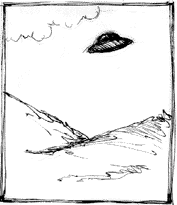 Growing Up Alien
Arriving in Nederland my nose bled. I'd never been so high up before. After a whole life (nine years) at sea level, I took my first thin breaths of mountain air through the open window of a rented truck, watching dutifully for falling rocks as we crept up the highway to 9,000 feet. Living in the mountains I would learn to look out for things that might come from above. Once Nederland had been a tungsten mining boomtown. By the time my family got there, in the late seventies, the area's population had leveled off at about 400 people. Some residents were descended from the original miners; others came in search of the usual Western virtues — cheap land, clean air, rugged mountain living. A substantial number of the newer arrivals were retirees from the nuclear plants down on the plains, who could be heard around town uttering mysterious words like alpha and gamma. In the old pine forest surrounding the town were about a dozen abandoned mines. One of these giant pits, filled with runoff and rainwater, had become known as Mud Lake. The others were now used as unofficial garbage dumps and target practice zones. Old refrigerators would appear in the forest overnight, and quickly their heavy carcasses would be consumed by bullet holes and rust, until only an intricate, collapsing skeleton remained.
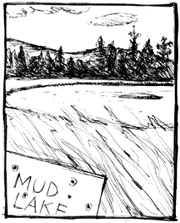 Our new house was at the top of a hill on Arapahoe Road, with the Rocky Mountain National Forest for a back yard. Our nearest neighbors on one side of the hill were a friendly young couple with a toddler and a pair of attack-trained Doberman Pinschers. The dogs gained some local notoriety when, it was rumored, they tried to devour someone's newborn baby. After this incident they were banished from the house to a small cyclone-fenced pen, but periodically their owners would let them run loose in the woods behind our house. Unfortunately, my father often tried to work off some of his own pent-up energy by tramping in the same patch of forest. Our relations with the neighbors took a turn for the worse after a few close encounters between my dad and the Dobermans.
 On the other side of the hill from us was a large Catholic family, nine or ten children total, all of them with birth defects affecting their legs and feet. The summer we came to Nederland I befriended one of this clan, a girl close to my age (the only one in the "neighborhood") with a relatively inconspicuous club foot. We went to the local rodeo together and I was allowed to eat lunch at her house. I remember watching her father, dressed in slacks, undershirt, and crucifix, say grace over the baloney sandwiches. Later we played pool in their basement, one corner of which was filled with outgrown and abandoned prosthetic devices.
 Summer in the mountains was lonely but tolerable. At least it was possible to walk for hours in the woods, despite roving Dobermans and amateur refrigerator hunters. Closer to home, I could study the behavior of ants, or spend entire days waiting for a particular chipmunk to emerge from the woodpile. When winter came, and it came early, outdoor activities were out of the question. Six-foot snowdrifts, relentless winds and constant subzero temperatures made cabin fever inevitable. In fact, considering these drawbacks, it's hard to figure out why we left California for Colorado. My father, a writer, must have liked the idea of working in alpine seclusion — kind of like Jack Nicholson in The Shining, which was filmed in a nearby town.
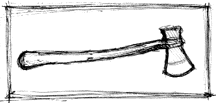 Given the harsh and isolated nature of the place, maybe it's not surprising that UFO sightings were common around Nederland, affecting backwoods survivalists and bohemian intellectuals alike. One of the first local UFO stories I remember hearing was one my parents told about an alien encounter in neighboring Eldora. It seemed some invisible extraterrestrial beings had decided to drop in on a party: they passed through a glass door, liquefying it in the process, and abducted some limes that their hosts had been planning to use for cocktails. Later the stunned earthlings discovered a large circle burned in the grass outside, traces of the alien craft. I recall hearing that one of the partygoers, Bill Burroughs, had helpfully theorized that there was a vitamin deficiency among the population of the visitors' planet — maybe the aliens had scurvy.
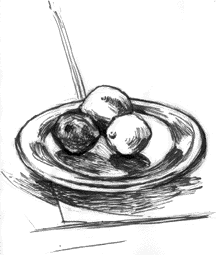 It wasn't long before an extraterrestrial influence began to make itself felt in our own household. First my father claimed he'd seen mysterious lights passing over the Continental Divide. Then there was the time my parents went out for a walk and returned saying they had spotted the tracks of an unearthly three-toed being in the snow outside. Soon afterward I discovered some inexplicable tracks myself, but still I was skeptical about the possibility of interplanetary contact; my imagination ran in more of a nineteenth-century gothic vein. For instance, I was convinced that the howling sounds produced by the hundred-mile-an-hour winds pounding our deck were actually the demonic cries of a giant, tormented black dog that haunted the roof above my room at night. My cynicism about UFOs began to erode when my father informed me that my mother had been briefly abducted by aliens late one night when she got up to adjust the thermostat. My dad found her unconscious on the kitchen floor; when she came to, after more than an hour, she had no recollection of what had happened. Dad concluded that she had been abducted by space monkeys. He had heard them in the walls that night, speaking some kind of high-pitched digital language. After that I made sure to listen for these interplanetary gibberings over the dog's howl that continued to disturb my sleep.
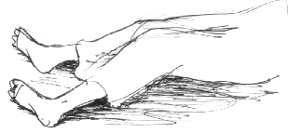
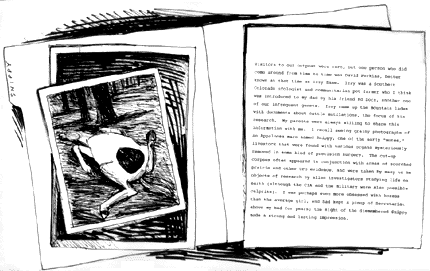 My father became increasingly interested in the mutilations and soon began collaborating with Izzy in his research. Dad was making a living at the time as the editor of a glossy magazine based in Boulder. The real purpose of the magazine was to publish advertising targeted at Boulder's many affluent young residents, but my father took it upon himself to add what he saw as a more journalistic edge to the publication's content. Under Izzy's influence, he devoted an entire issue of the monthly to the Mute Problem. The issue featured in-depth investigative reporting and a comprehensive map of mutilation sites nationwide, helpfully adjusted to show the relationship between mute locations and military and nuclear installations. A man-on-the-street interviewer was sent out to ask local citizens, "Do you believe in UFOs?" When he posed this question to the lead actress from Mork and Mindy, a situation comedy about a lovable alien living in Boulder, she repied:
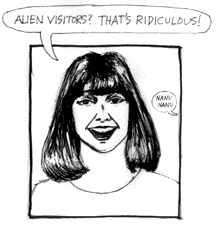
After a car accident in which my dad was plunged off a cliff into an icy river, breaking some ribs, my parents decided to give up the struggle to survive in the mountains and move downriver into Boulder. The move was largely beneficial for me, at least as far as entertainment was concerned; instead of spending my days holed up in our perpetually snowed-in alpine compound, I could hang out on the Pearl Street Mall and witness the filming of Mork. I was also able to attend a real school. Flatirons Elementary prided itself on a "progressive" curriculum involving a lot of field trips, mostly to corporate sites. We got to visit a Coca-Cola plant and a Keebler factory, conversing with giant papier-mache elves and collecting free samples along the way. Then there was a trip to a huge ranch out on the plains, where we watched cattle riding on conveyor belts to the slaughterhouse and learned from dioramas what chewing gum is really made of. The same year, for reasons that were never explained, we spent a day observing some red buttes like the ones made famous by Close Encounters of the Third Kind. But most impressive was our excursion to NORAD. No one seemed willing to tell us exactly what kind of research went on there. After a tour of an underground cavern full of giant humming computers, we were given machine-generated pictures of Snoopy. Although I was pleased with my souvenir, I sensed that it was intended to distract us from the real mission of the place: I knew, I had heard somewhere, they were watching the sky. Meanwhile, the mystery of the mutes continued. At home one evening, I listened to my parents discussing a theory that the cattle to be mutilated were selected in advance and marked with ultraviolet or radioactive brands that only the alien perpetrators could detect. I instantly began to worry that I had been accidentally branded in this way and that an invisible sign on my forehead would eventually lead the aliens to me. I stayed awake many nights listening to the mosquitoes buzzing on my bedroom ceiling and wondering when I would be whisked away to have my vital organs removed by lasers. By day I would spend long afternoons leaning on the sill of our living room window, looking out across the snowy expanse of the neighbors' lawn and waiting for the aliens to come creeping over the horizon from invisible ships. If I stared long enough I could almost see them shimmering into focus, gliding lightly in my direction.
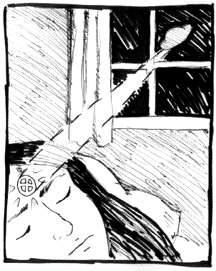 UFOs weren't the only objects of my father's muckraking or my own anxious fantasies in this period. We landed in Boulder during the heyday of the Naropa Institute, a Tibetan Buddhist academy that served as a kind of spiritual headquarters for the Beat generation; it also attracted the same upmarket types to whom my dad's magazine catered. The school's adherents identified themselves by tying thin red strings around their necks. (I remember swimming in a well-to-do friend's apartment-house pool, surrounded by young professionals identically outfitted in red strings and Speedos.) Exploiting his literary connections, my father decided to discover and expose the cultlike operations of Naropa and its leader, provoking some hostile reponses. Soon after my dad's investigations appeared, there were several attempts to break into our house. I began to have recurring nightmares in which prominent beatniks pursued me with machetes. Waking from these dreams I would realize that even if Ginsberg didn't get me, it wouldn't be long before the aliens came for my liver.
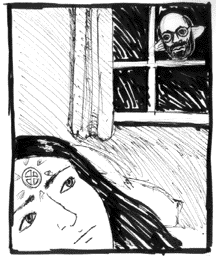 Toward the end of our stay in Boulder, some friends of my parents took us to a Christmas party in a bleak condo development on the outskirts of the city, not far from the Rocky Flats nuclear power plant. After dinner, the adults' conversation turned to the then-recent remake of Invasion of the Body Snatchers. The pod people, I learned, didn't even wear red strings around their necks; they could be anywhere. This confirmed all of my worst fears. Unable to listen any longer, I ran upstairs and watched in relief as a teenager terrorized some other kids with a detailed analysis of The Texas Chainsaw Massacre. We only lasted two winters in Colorado before moving back to the coast. Once when I was a teenager Izzy Zane, traveling under a different name, paid us a visit in California. Eventually, inevitably, talk came around to UFOs. Izzy was having some success on the talkshow and tabloid circuit with a new theory: the cattle mutilations were a manifestation of the Jungian collective unconscious. That was more than ten years ago. I have no idea where Izzy is now.
|
- - - - - - - - - - - - - - - - - -
[go home]
- - - - - - - - - - - - - - - - - -
© 1996